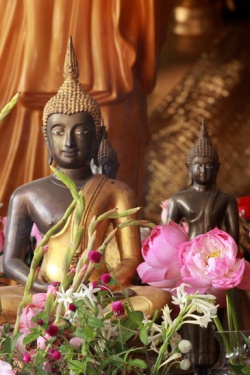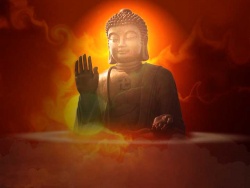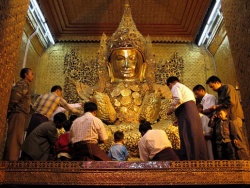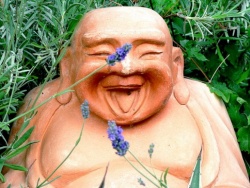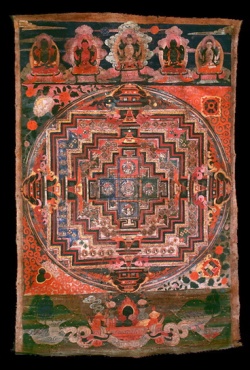Difference between revisions of "Buddhism and Confucianism - Some Thoughts"
m (Text replacement - "meat" to "meat") |
m (Text replacement - "]]]" to "]])") |
||
| Line 20: | Line 20: | ||
:Question: In [[mundane]] [[ethics]] it is considered unfilial to not exact revenge against your father’s enemy. Why is it that here if you do exact revenge it is unfilial? | :Question: In [[mundane]] [[ethics]] it is considered unfilial to not exact revenge against your father’s enemy. Why is it that here if you do exact revenge it is unfilial? | ||
| − | Answer: The [[path]] and the [[mundane]] are opposites. The [[mundane]] is based on the {{Wiki|present}} and does not speak of [[causes]], [[conditions]] and [[karmic]] results to come. Now if you repeatedly take revenge, the [[karma]] for [[suffering]] will multiply and it will make your father sink [into [[saṃsāra]] | + | Answer: The [[path]] and the [[mundane]] are opposites. The [[mundane]] is based on the {{Wiki|present}} and does not speak of [[causes]], [[conditions]] and [[karmic]] results to come. Now if you repeatedly take revenge, the [[karma]] for [[suffering]] will multiply and it will make your father sink [into [[saṃsāra]]) forever. How could that be fulfilling the [[path]] of filial piety? Moreover, these enemies might have been one’s own [[parents]] in a {{Wiki|past}} [[life]]. Now if you kill them, how could you [[accomplish]] filial acts? Thus it states, “It is not in accord with the [[path]] of filial piety.” |
This is in reference to the aforementioned passage from the Liji. [[Fazang]] clearly wrote his commentary with educated laypeople in [[mind]]. He spent much of his career in [[Chang’an]] and was close to the {{Wiki|imperial}} family, so we can assume his [[discussion]] of [[ethics]] also reflect that strata of {{Wiki|society}}, though we can [[imagine]] commoners would have held the same [[ideas]] as well. | This is in reference to the aforementioned passage from the Liji. [[Fazang]] clearly wrote his commentary with educated laypeople in [[mind]]. He spent much of his career in [[Chang’an]] and was close to the {{Wiki|imperial}} family, so we can assume his [[discussion]] of [[ethics]] also reflect that strata of {{Wiki|society}}, though we can [[imagine]] commoners would have held the same [[ideas]] as well. | ||
Latest revision as of 03:59, 4 April 2016
Buddhism and Confucianism - Some Thoughts
By Indrajala (Jeffrey Kotyk)
Earlier I discussed Buddhism and Daoism and addressed the question of how much Daoism influenced Buddhism in China. I believe that the influence was small compared to how much the latter influenced the former. In terms of Confucianism, however, I believe the influence was a lot deeper in both obvious and subtle ways.
Since Buddhism first settled into China in the Eastern Han Dynasty 東漢 (25-220) there has always been and still is ongoing discussion about its compatibility with the traditional culture of highly prescribed and ritualized human interactions which is associated with Confucianism. While the term ‘Confucianism’ in English is problematic and even anachronistic when speaking about pre-Song Dynasty 宋朝 (960-1248) intellectual schools, it corresponds to Ru-jiao 儒教 in Chinese, which for our purposes is a distinct identity apart from Dao-jiao 道教 (Daoism) and Fo-jiao 佛教 (Buddhism). Incidentally, for a good article on the early development of Ru-jiao see "What Did It Mean to Be a Ru in Han Times?" by Anne Cheng.
On the surface some Confucian ideas such as the five constant virtues 五常 (benevolence 仁, justice 義, propriety 禮, wisdom 智, and trust 信) are quite compatible with Buddhist ethics, but going beyond that there are numerous incompatibilities as well. For example, until the Song Dynasty the Confucian tradition focused on the Five Classics 五經 (note: the Analects or Lun Yu 論語 is not included), one of which is the Liji 禮記, which formed the basis for Confuciuan thought. In it we find encouragement for violent revenge:
- 曲禮上:
- 父之讎,弗與共戴天。兄弟之讎不反兵。交游之讎不同國。
- Qu Li I:
- With the enemy who has slain his father, he should not live under the same sky. With the enemy who has slain his brothers, he does not even return home to retrieve his weapons. With the enemy who has slain his good friend, he does not live in the same country.
This idea was common sense among premodern Chinese intellectuals as studying (or memorizing) said text along with the other classics was part of a proper education. Everyone with a complete education knew the Five Classics and the ideas therein. Fazang 法藏 (643-712) addresses just this issue in his commentary on the Brahma Net Sūtra:
- 《梵網經菩薩戒本疏》卷5:「問俗禮之中君父之怨不報非孝。何故此中若報非孝耶。答道與俗反。俗據現在不說當來因果業報。今若重酬苦業滋多、令其君父沈淪永劫、何成孝道。況此怨等何必前生非己父母。今若殺彼豈成孝行。故云不順孝道也。」
- Question: In mundane ethics it is considered unfilial to not exact revenge against your father’s enemy. Why is it that here if you do exact revenge it is unfilial?
Answer: The path and the mundane are opposites. The mundane is based on the present and does not speak of causes, conditions and karmic results to come. Now if you repeatedly take revenge, the karma for suffering will multiply and it will make your father sink [into saṃsāra) forever. How could that be fulfilling the path of filial piety? Moreover, these enemies might have been one’s own parents in a past life. Now if you kill them, how could you accomplish filial acts? Thus it states, “It is not in accord with the path of filial piety.”
This is in reference to the aforementioned passage from the Liji. Fazang clearly wrote his commentary with educated laypeople in mind. He spent much of his career in Chang’an and was close to the imperial family, so we can assume his discussion of ethics also reflect that strata of society, though we can imagine commoners would have held the same ideas as well.
The Liji also prescribes animal sacrifices and meat eating. The former is of course incompatible with the Buddhadharma where the Buddha condemned animal sacrifice as a wicked and awful act. As for the latter, meat eating in Chinese Buddhism was especially taboo after the 6th century when meat eating was expressly forbidden under Emperor Liangwu's 梁武帝 reign (502–549), which I wrote about here.
The other texts of the Five Classics likewise generally reflect the same ideas and values expressed in the Liji. They reflect the values of ancient Chinese aristocrats, many of whom were warriors or involved in war given their profession of statecraft. They are not the work of sages preaching non-violence.
The Analects was not included in the five, but was later adopted as canonical by Zhu Xi 朱熹 in the Song Dynasty, where he included it in the Four Books 四書. If you ignore the Five Classics and focus just on what Confucius is quoted as saying in the Analects, then there is less objectionable material than in the Five Classics, but it must be understood that the aforementioned texts are the canon of Confucianism and form the core basis for their values, morals and outlook on life. It might also be noted that Confucius is thought to have edited the Five Classics, so he was an active participant in propagating texts which both prescribe animal sacrifices and encourage violence in certain circumstances (incidentally, animal sacrifice is still done in Taiwan, though the killed fowl are preserved and packaged ahead of time and sold at grocery stores). This does not seem to have entered into the minds of many Buddhist authors throughout Chinese history who often regarded him as a wise sage.
Nevertheless, by the time Buddhism became prominent in China Confucian ideas were quite mainstream. In the Tiantai text Commentary on the Sūtra for Humane Kings 仁王經疏 by Zhiyi 智顗 (538-597), the precept against killing is matched with Confucian virtue of benevolence while not stealing is matched with wisdom, not committing sexual misconduct is matched with justice, not consuming alcohol is matched with propriety and not speaking falsely is matched with trust. The five constant virtues are associated with the five Buddhist precepts.[1]
Some years before Zhiyi, Sengzhao 僧肇 (384-414?), a disciple of Kumārajīva (334-413), in his famous Zhao Lun 肇論 (The Treatises of Zhao) quotes Confucius as a valid authority in explaining some of his ideas. Thus we know early on prominent authors were interested in highlighting similarities between their indigenous Confucian ideas and Buddhadharma. This was harmless enough and even earlier in the 3rd century we see in the preface to the early Chinese translation of the Dharmapada a quote from the Indian monk Vighna, who brought the original text to China and translated it, and a subsequent remark citing Laozi and Confucius in a similar vein:
- 《法句經》卷1:維祇難曰:「佛言:『依其義不用飾、取其法不以嚴。』其傳經者令易曉,勿失厥義,是則為善。」坐中咸曰:「老氏稱:『美言不信、信言不美。』仲尼亦云:『書不盡言、言不盡意。』明聖人意深邃無極,今傳梵義,實宜經達。」(CBETA, T04, no. 210, p. 566, c9-14)
- Vighna stated, “The Buddha said, 'Rely on the meaning without using adornments. Extract its teachings without embellishing it.' Those who transmit the sūtras should make it easily understood. Do not lose the meaning. This would be good.” Zuo Zhong Xian 坐中咸 stated, “Master Lao said, 'Sincere words are not fine. Fine words are not sincere.' Confucius also said, 'Written works do not fully express language. Language does not fully express meaning.' This explains that the sages' meanings are profound without limit. Now in transmitting the Indic meanings we should be practical and the sūtra will be communicated.”
I think it is reasonable to say that over the last eighteen or nineteen centuries that Buddhism has existed in China the ideas of Confucius have been largely respected and drawn upon if not simply because as a figure he was generally respected by everyone, but he was also just so well known. Still, the other aspects of Confucianism such as animal sacrifice could not be carried out by any orthodox Buddhist.
One other thing that comes to mind about Confucian influence in Chinese Buddhism is the religious theatre that is played out in shrine halls according to prescribed form and replete with orchestrated music and the assembly bowing and chanting together in unison. While of course musical instruments are to be seen elsewhere in the Buddhist world both at present and historically, I believe Chinese Buddhism very early on took a special appreciation for music, perhaps again owing to cultural trends rooted in such statements from Confucius as follows:
- 子曰:「興於詩,立於禮。成於樂。」
- The Master said, "The mind is aroused by poetry. The character established through the rites. One is made complete through music.”
Now of course I have only personally observed contemporary ceremonies in Taiwan and China, though reading the Japanese monk Ennin's 圓仁 (794-864) journal from when he visited China in the mid 9th century and all the ancient musical instruments and procedures preserved in Japan, I am confident that the same level of musical performances were happening in China in the early times. Chinese monks and nuns often spend considerable amounts of time perfecting their art of playing "Dharma instruments". As Confucius suggested, music is employed a means of transforming an individual's character in a positive way. Chinese Buddhist ceremonies go to great lengths to have everyone skilfully recite from memory lengthy texts (the poetry) while the assembly does choreographed motions (the rites) complete with the "Dharma instruments" being played (the music). This in itself is considered essential practice and cultivation.
The intellectual exchange went both ways of course, especially in the post-Tang world. For instance, the Neo-Confucian school was interested in questions of a metaphysical nature and while they were often at odds with Buddhism albeit holding a begrudging respect towards them, they were nevertheless initially prompted to discuss such things by Buddhist metaphysics.
In a similar vein, Wang Yangming 王陽明 (1472-1529) was promoting a meditation method of quiet sitting 靜坐 which as a Confucian contemplative practice was likewise a part of Zhu Xi's philosophy. Quiet sitting here is different from most forms of Buddhist meditation, though nevertheless the Neo-Confucians were influenced by Buddhism, mostly likely Chan, in coming to have such practices.
Footnotes
- ↑ 《仁王護國般若經疏》卷2〈1 序品〉:「以不殺配東方。東方是木。木主於仁。仁以養生為義。不盜配北方。北方是水。水主於智。智者不盜為義。不邪淫配西方。西方是金。金主於義。有義者。不邪淫。不飲酒配南方。南方是火。火主於禮。禮防於失也。以不妄語配中央。中央是土。土主於信。」(CBETA, T33, no. 1705, p. 260, c25-p. 261, a6)
